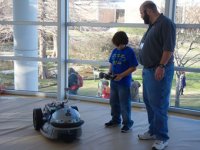Teamwork Takes Teachers to the Moon
Your content has been saved!
Go to My Saved Content.This summer, I got the opportunity to visit NASA Kennedy Space Center through a generous grant from the General Electric Fund and the National Science Teachers Association. The partnership sponsored around a hundred of us to go to Cocoa Beach, Florida, and partake in a series of intense professional development sessions on campus. As a math teacher, I wasn't exactly sure what my purpose was there, but I knew two things: I wanted a rocket shuttle to take home, and I wanted to pretend to be an astronaut when I went back home.
Sadly, I couldn't take a shuttle home.
Instead, I partook in one of the most relevant PD sessions I ever attended. The premise of the workshops was to build rovers with kits and use all available tools to create a robot that would park in one tight spot. Here, I share some of my learning from that week.
Expertise Should Always Be Valued
Our party consisted of two groups: returning teachers who had already worked on these projects last year and new teachers who hadn't the slightest idea what they would be doing. I was in the former group. During our first meeting, we spent time building our rovers and making sure they worked. My pair -- another math teacher and I -- had a hard time just remembering how to put the pieces together to form a rover. After that, however, things went much faster.
Why? Because our test to make sure that our rover worked was to make it drive a few feet, turn left, drive another couple of feet, turn right, drive another few feet, then stop. This involved a bit of angle measurement, and programming. While my partner and I weren't master rover-builders, we knew our way around a ruler and a protractor. Within an hour, our rover passed the prerequisites and was ready for prime time.
Embrace the Unknown
While the veteran group worked on their rovers, the new group worked on scanning a surface and creating a map of a given square space. The purpose for creating this map was to get the rover to a given point based on the mapmakers' accuracy. Obviously, the new group had to develop a method for getting as much information as they could by using their rover's scanners to calculate altitudes and slopes. My pair had to depend on the map we were given -- and nothing else.
In other words, we had to see what the rover saw, and work through its point of view.
In many ways, this taught us to embrace the unknown. So many variables go into actual space exploration that we can only estimate based on the information given to us. As learners, we could only control what we knew given the tools we had: a rover, a calculator, a ruler and an eight-bit map.
Playing to Everyone's Strengths
The temptation for the returning teachers was to take over the project and make the new teachers stand aside. However, they had just acquired a set of skills: programming. They knew how to create loops and send commands in the program comfortably. All they needed was a plan on how to approach this "map" and the mathematics behind it. Naturally, my pair took the lead and started plugging away. We narrated everything as we did it so that everyone else could jump in and contribute when necessary. When we had a refined diagram, the new teachers jumped in and programmed the robot with little help from us.
We played to everyone's strengths in the group and made sure that they all felt invited.
From there, we set the robot on its mission. Needless to say, within a few minutes, we got it to work consistently. We'd laid out a plan, and now everyone felt comfortable with our plan.
Most importantly, we all felt like engineers. We didn’t "win" anything for having completed the project first or second. The fact that we did a simplified version of what engineers and rocket scientists do for a living gave us enough exhilaration. While other groups had different results, I noticed that, when we stuck to a few key principles for completing these projects, we all felt like winners.
But it still would have been nice to drive down Broadway in the Space Shuttle Atlantis. Oh well.
